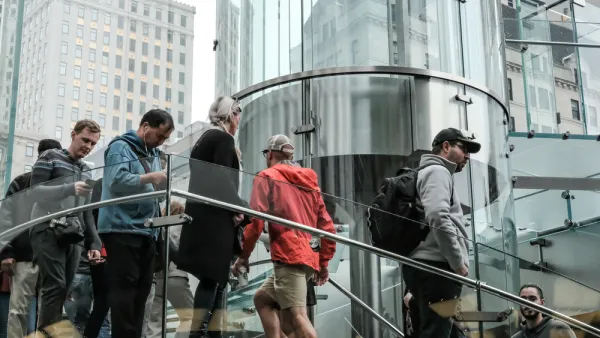Offering a list of policy innovations in several emerging mega-cities, URB.im managing editor Josephine d’Allant argues for empowerment over charity in the battle to improve conditions for the urban poor.
The most effective urban anti-poverty programs, d’Allant argues, are those that provide low-income groups with the “tools to help themselves.” For d’Allant, this means a focus on not only creating, but enabling employment.
D’Allant cites the case of Rio de Janeiro, where the government is expanding access to childcare services in an effort to enable the growth of two-income households. Alongside this, the government is partnering with NGOs to improve job skills and offer training courses to improve employability.
In addition to providing childcare services and training courses, d’Allant argues that increasing access to technology is another effective way to reduce urban poverty. In Jakarta, d’Allant finds pioneering work by IT activist Onno W. Purbo, who is seeking to expand affordable internet access among the urban poor. This, d’Allant argues, is a major step towards closing the “digital divide,” which is a major barrier to not only employment, but technical skills and employability.
Next, d’Allant offers examples where new government programs are striving to improve opportunities for those facing multiple barriers to employment. In Mumbai, a program called Mettaa employs blind individuals to give reflexology massages and, in so doing, increases both their self-sufficiency and combats the exclusionary stigmas often faced by India’s disabled.
D’Allant explores these examples further and invites others to contribute on the urb.im blog. In the quest for “just and inclusive cities,” d’Allant writes, programs that enable the urban poor to improve their own welfare are “in many ways more compassionate, and certainly more empowering, than any charity program.”
FULL STORY: Give the Urban Poor Opportunity, Not Just Charity

National Parks Layoffs Will Cause Communities to Lose Billions
Thousands of essential park workers were laid off this week, just before the busy spring break season.

Retro-silient?: America’s First “Eco-burb,” The Woodlands Turns 50
A master-planned community north of Houston offers lessons on green infrastructure and resilient design, but falls short of its founder’s lofty affordability and walkability goals.

Delivering for America Plan Will Downgrade Mail Service in at Least 49.5 Percent of Zip Codes
Republican and Democrat lawmakers criticize the plan for its disproportionate negative impact on rural communities.

Test News Post 1
This is a summary

Test News Headline 46
Test for the image on the front page.

Balancing Bombs and Butterflies: How the National Guard Protects a Rare Species
The National Guard at Fort Indiantown Gap uses GIS technology and land management strategies to balance military training with conservation efforts, ensuring the survival of the rare eastern regal fritillary butterfly.
Urban Design for Planners 1: Software Tools
This six-course series explores essential urban design concepts using open source software and equips planners with the tools they need to participate fully in the urban design process.
Planning for Universal Design
Learn the tools for implementing Universal Design in planning regulations.
EMC Planning Group, Inc.
Planetizen
Planetizen
Mpact (formerly Rail~Volution)
Great Falls Development Authority, Inc.
HUDs Office of Policy Development and Research
NYU Wagner Graduate School of Public Service





























